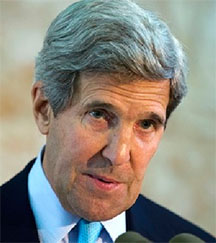ANKARA/BRUSSELS (Reuters) – Iran yesterday appeared to rule out participation in Syrian peace talks later this month, dismissing a US suggestion that it could be involved “from the sidelines” as not respecting its dignity.

US Secretary of State John Kerry suggested on Sunday there might be ways Iran could “contribute from the sidelines” in a so-called Geneva 2 peace conference in Montreux, Switzerland, on January 22, and yesterday US officials said Tehran might still be able to play a helpful role.
UN Secretary-General Ban Ki-moon was sending out invitations yesterday to potential participants the talks, but while he wants Iran to attend there was no agreement yet on whether to invite it.
The key players in the talks are President Bashar al-Assad’s government and opposition rebels who have been fighting for nearly three years to oust him. Syrian opposition groups and Washington, which accuse Tehran of supporting Assad with manpower and arms during the uprising against him, have long had reservations about the participation of Iran, although the UN special envoy on Syria, Lakhdar Brahimi, has backed Tehran’s involvement.
While there has been a warming in US-Iranian ties this year including a November 24 deal to curb the Iranian nuclear programme, there are no visible signs that this has led to greater improvement in other areas such as Syria, where they are on opposite sides of the civil war.
Kerry reiterated US opposition to Iran being a formal member of the peace talks because it does not support a 2012 international agreement on Syria.
That “Geneva 1” accord called for the Syrian government and opposition to form a transitional government “by mutual consent”, a phrase Washington says rules out any role for Assad. Russia, a sponsor of the plan, disputes that view.
Yesterday, US officials said Iran could improve its chances of playing a role on the sidelines of the Syria peace talks by working with Damascus to stop the bombardment of civilians and improve humanitarian access.
“There are … steps that Iran could take to show the international community that they are serious about playing a positive role,” one of the officials said in Brussels.
“Those include calling for an end to the bombardment by the Syrian regime of their own people. It includes calling for and encouraging humanitarian access.”
Another official made clear that the comment on bombardment referred to Syria’s biggest city, Aleppo, where dozens have been killed in raids in which the Syrian air force has used improvised barrel bombs.
Iran had however given no indication it was ready to take any of these steps, a US official said, and noted there was opposition to Tehran’s participation from other nations. The official did not identify these, but they are likely to include Gulf Arab states such as Saudi Arabia, Iran’s regional rival.
The US officials, who declined to be named, said Washington still believed it was “less likely than likely” that Iran would play any role at the conference, even on the sidelines, and Iran and the United States had not discussed the matter directly.
State Department spokesman Marie Harf said that for the Iranians even to be considered for any role in the talks “they would have to demonstrate that they would do things that would be less destructive in Syria.”
White House spokesman Jay Carney said Iran would have to publicly endorse the terms of the “Geneva I” accord if it wanted to participate in the process.




